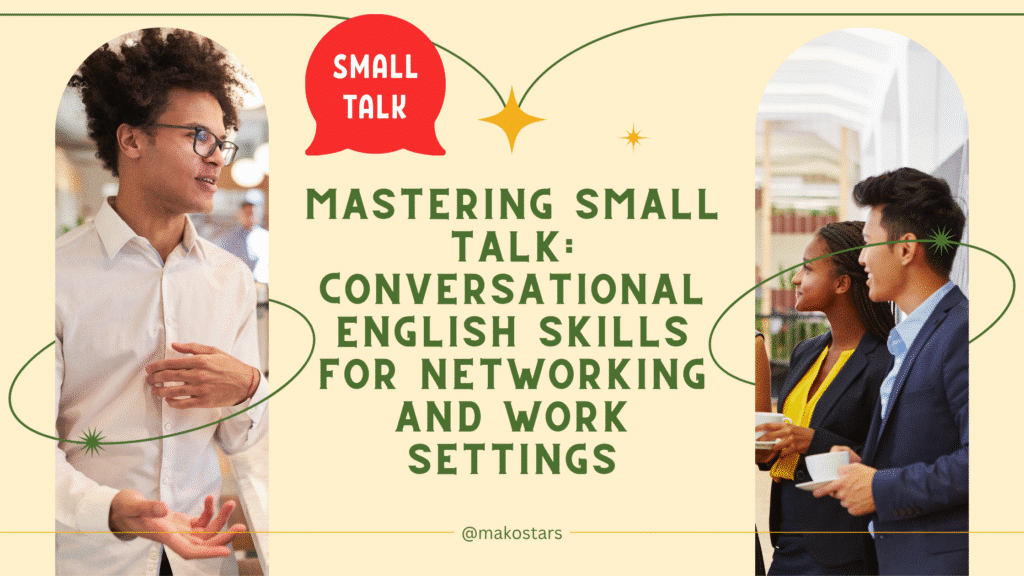Small talk makes up about one-third of an adult’s speech. These quick, casual exchanges are vital social bridges that connect us in our daily lives.
These casual chats pop up everywhere, when you bump into neighbors at the supermarket or during coffee breaks at work.
Your workplace needs more than just technical skills. You should know how to have casual conversations with colleagues and clients during meetings and events. On top of that, becoming skilled at small talk can ease social anxiety and build valuable connections.
Here’s something encouraging: Good conversations start with broad topics and flow naturally into more specific ones. This piece will help you find practical Small Talk Examples, conversation starters that work, and ways to build confidence.
Breaking the Ice: Real-Life Small Talk Examples
A room full of strangers can feel scary, but these moments give you great chances to make new connections. A recent survey shows 71% of Americans would rather sit quietly than make small talk. The good news is you can turn awkward situations into great conversations by becoming skilled at talking to people in different settings.
Meeting someone at a conference
Conferences are perfect for networking, but they can feel overwhelming at first. The other attendees want to meet new people too, and starting a conversation actually helps them out. Put your phone away when you sit down for a session and talk to the person next to you instead.
Here are some great ways to start a conference conversation:
- “Are you familiar with this speaker?” or “What made you pick this session?”
- “How do you like the conference?” or “Which talk are you looking forward to?”
- “Will you be at the [panel name] session? I can’t decide if I should go.”
- “What would you change if you hosted this conference?”
Someone asked an interesting question during the session? Just tell them, “I really loved that question you asked”. You can also make yourself more approachable by asking thoughtful questions during Q&A sessions.
Starting a chat on a plane or train
Travel creates natural openings for conversation because you share an experience with other travelers. Some Australians on a train from Venice to Rome showed this perfectly – they started playing “Would You Rather” with other passengers and talked for hours.
Try these travel conversation starters:
- “What’s your favorite seat on the plane?” or “What do you like to do during flights?”
- “Do you know any good restaurants around here?”
- “Is this your first time in [name of city/town]?”
- Share a quick travel tip and ask about their recommendations for your destination
These icebreakers work well because they fit the situation. One traveler started a simple nationality-guessing game in a Vietnam bar that led to a group traveling together across the country. Your shared travel experience makes great conversation material.
Small Talk Examples: Talking to a coworker in the break room
The office break room gives you easy chances to practice small talk with colleagues. These casual chats help build stronger workplace relationships and create a better work environment.
Here are some break room conversation starters:
- “How’s your day going?” or “How’s the report coming along?”
- “Did you see the [game/TV show/event] last night?”
- “Where do you like to grab lunch around here?”
- “What’s the funniest thing that ever happened to you at work?”
Food makes a great topic in break rooms. Everyone eats and most people have strong opinions about food, which makes it a safe conversation starter. Questions about food can reveal interesting details about people without being too personal.
Office news works really well too. A simple question like “Have you tried the new coffee maker?” can start a good conversation. These small chats build connections that improve your workplace relationships over time.
Note that your body language plays a big role in all these situations. People often cross their arms and avoid eye contact when they feel uncomfortable, which pushes others away. Keep an open, welcoming posture to encourage people to talk to you.
Small Talk Conversation Starters That Work
Conversation starters help people connect meaningfully with others. Good small talk sounds natural and builds rapport while helping people find common ground.
Questions about the environment or events
Your surroundings offer excellent conversation material since they create shared experiences. These environmentally-focused conversation starters work great at conferences and networking events:
“What brought you to this event?” This question reveals people’s interests naturally.
“What do you think of this venue?” People love sharing opinions about their surroundings, which can lead to discussions about architecture, design, or other events.
Social consciousness sparks thoughtful dialog. You might ask “Have you noticed any changes in the weather or seasons where we live?” or “What do you think are the biggest effects of climate change on our daily lives?”.
Professional functions create opportunities for fun questions like “If you could only attend one type of networking function for the rest of your life, would you choose breakfasts or happy hours?”. This playful format encourages quick, personal responses.
Comments on food, weather, or location
Food remains one of the most engaging small talk topics. People love talking about what they eat.
Simple observations work best: “Have you tried any of the food? What’s good?” or “This venue has an interesting menu. What would you recommend?”. These questions make the other person feel helpful while acknowledging your shared experience.
Weather talk can be interesting. Skip the obvious rain or sunshine comments and ask “If you could choose to live anywhere based solely on weather conditions, where would it be?”.
Location questions shine in new places: “What’s your favorite part about living in [city]?” or “If you could recommend only one restaurant in [city], which would you choose?”.
Local topics create instant connections: “Do you know any cool local places to hang out?” or “What do you like most about living here?”.
Asking about hobbies or interests
People light up when talking about their passions. These conversations often become the most engaging.
Simple questions like “What do you do for fun?” or “How do you enjoy spending your free time?” let others share their favorite activities.
Media discussions reveal personal tastes: “What are you reading right now?” or “Have you been watching anything interesting lately?”. These questions naturally lead to deeper conversations.
Travel stories spark enthusiasm. Ask “What’s the most interesting place you’ve ever been?” or “Do you like to travel?”. People love sharing their memorable experiences.
Sports create bonds through shared excitement. Beyond favorite teams, ask “What sports did you play in school?” or “Do you have athletic hobbies outside traditional team sports like cycling or hiking?”. These questions uncover interesting life stories.
Note that good small talk requires genuine interest in others’ responses. The goal extends beyond filling silence – it creates meaningful connections through casual conversation.
Have a look at our article on Conversational English Skills for networking and work settings here below.

Business Small Talk Examples for the Workplace
Professional communication needs more finesse than casual conversations. Small talk is a vital bridge between formal discussions and personal connections in business settings. It helps build rapport with colleagues and clients alike.
How to greet professionally
Your greeting sets the tone for every professional interaction. “Hi [Name]” works best in most emails. It’s friendly, direct, and personal. “Hello [Name]” adds more professionalism while you retain a personal touch.
“Dear [Name]” remains the most appropriate choice when you address someone in authority or handle formal situations. “Greetings” provides a safe, polite email opener if you’re unsure about someone’s name or spelling.
Face-to-face greetings stay professional when you:
- Use the person’s name when possible
- Give a firm handshake (when culturally appropriate)
- Make eye contact that shows confidence
- Add relevant openers like “It’s good to see you again” or “I’ve been looking forward to meeting you”
Safe topics to discuss with colleagues
The right conversation topics help build relationships without crossing professional boundaries. Research shows that rapport between coworkers helps create natural positive relationships in office environments.
Work-related conversation starters that work well:
- “What projects are you working on currently? Which is your favorite?”
- “How long have you worked here? Where did you work before?”
- “What’s the funniest thing that ever happened to you here?”
- “How did you start working in your occupation?”
Hobbies, travel plans, or sports create common ground beyond work topics. Questions like “Do you have any vacations coming up?” or “Have you seen any good movies lately?” let colleagues share interests without getting too personal.
Great workplace small talk finds the sweet spot between professional interest and personal curiosity. Stay away from topics that divide people like politics, religion, or private matters.
Check out our blog article on Safe and engaging small talk topics here below!

Small talk conversation examples for meetings
Meetings give you perfect chances to strengthen professional relationships through meaningful small talk. Research shows that managers often set aside time at the start of meetings to build rapport among attendees.
These conversation starters work well before the meeting starts:
- “What’s the main goal of today’s meeting?”
- “How has your week been so far?”
- “Any updates or progress on your projects?”
- “What do you hope to achieve by the end of this meeting?”
Questions like “What’s your approach to problem-solving in the workplace?” or “How do you prioritize tasks when you have multiple deadlines?” help build connections during meeting breaks.
Remote work has made in-person small talk challenging for many professionals. The best strategy focuses on connection rather than perfection. Hong Kong-based speaker Akash Karia says it well: “If you focus on being genuinely curious about the other person’s life, rather than the fear of saying the wrong thing, you’ll find it’s much easier to have a conversation”.
Travel-Friendly Small Talk Topics

Image Source: Fodors Travel Guide
Travel opens up amazing opportunities to have meaningful conversations with people from a variety of backgrounds. A simple chat on a plane or while exploring a new place can reshape the scene of your entire experience.
Asking about destinations and plans
Fellow travelers love to talk about their travel plans. You can start conversations that show real interest in their adventures:
“What plans do you have for your vacation? Will you travel or stay closer to home?” This question works great before someone leaves or after they return.
“How do you usually decide on a travel destination?” People’s answers reveal their priorities and travel style.
“Where would you like to travel to next? When do you think you will go there?” These questions let people share their dreams and hopes.
Travelers on longer trips respond well to “How long can you travel before you start to miss home?” The conversation often moves to what they value most.
Sharing travel tips and experiences
Swapping practical advice helps you connect with other travelers quickly. Your listening skills matter as much as your own stories.
“What’s the best way to keep your money safe when traveling?” This practical question shows you care while getting useful tips.
“What websites or apps do you use when traveling?” People often share tools you might not know about.
Food talks always spark excitement. Ask “Which area has the best food in your experience?” You’ll learn about great food and find common interests.
Using small talk to connect with locals
Local people offer the most authentic travel experiences. The right approach makes all the difference:
“Can you recommend any local restaurants or hidden gems nearby?” Locals love to share expert knowledge about their hometown.
A few basic phrases in the local language show respect and openness to their culture. Even simple words like “hello” and “thank you” make a difference.
Local dishes tell stories of culture and history. Questions about why certain spices or cooking methods are used show genuine interest in local traditions.
Pick the right moment to chat with locals. Look for settings where people seem relaxed and have time to talk. Let them set the pace of the conversation.
How to Build Confidence in Small Talk
Building confidence in small talk needs practice, just like any other skill. Research shows people who participate in a week-long exercise of talking to strangers become more optimistic and confident about their conversation skills each day.
Practice in low-pressure settings
Your path to comfortable small talk starts with practice in familiar places. Talk to friends and family members first. Then slowly expand your circle to include acquaintances and strangers. These early conversations become your training ground to develop social skills.
Look at how others start conversations in your social circles. Notice their approaches, questions, and ways to keep the dialog going. See which behaviors provoke positive reactions versus negative ones. You can then add effective strategies to your own conversations.
Here’s how you can overcome perfectionism that blocks natural conversation:
- Set small, achievable goals for social interactions
- Try “conversational experiments” where you speak more freely
- Challenge yourself with brief social interactions daily
- Listen actively by focusing on others’ responses
You can try what experts call “social mishap experiments” – making small conversational mistakes on purpose to test your fear of imperfection. This unusual approach proves that minor social slip-ups rarely lead to the disasters anxiety makes us expect.
Note that people usually enjoy our company more than we think – researchers call this “the liking gap”. This fact can help when self-doubt appears during conversations.
Practice consistently matters most. Studies show that people with social anxiety who try a series of conversational experiments gather evidence against their fears. This reduces anxiety and builds confidence over time. Start with structured situations, then challenge yourself in unfamiliar settings.
Regular practice turns small talk from a scary task into a natural skill that creates meaningful connections.



